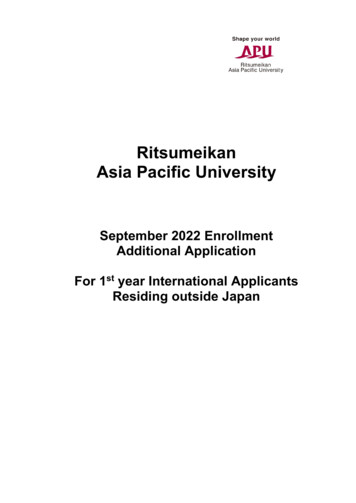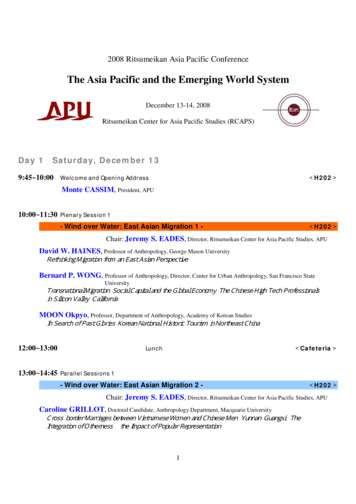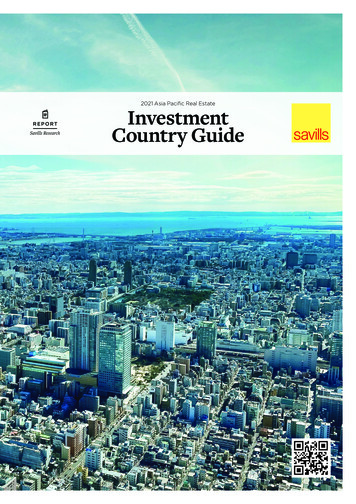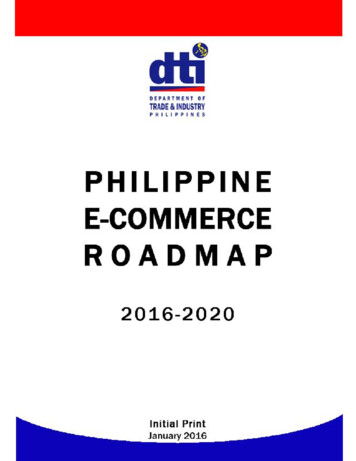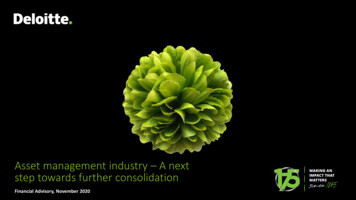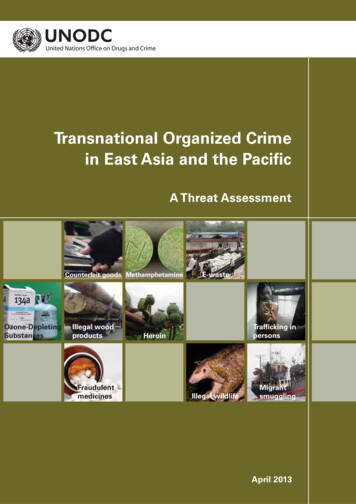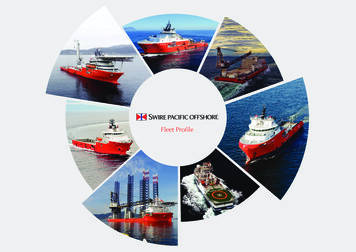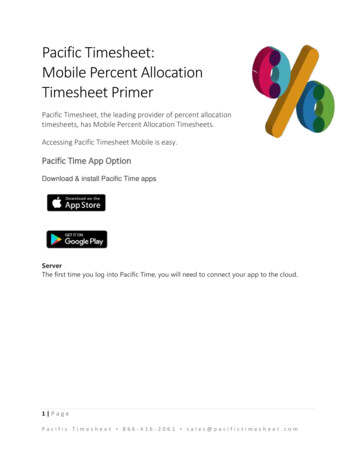
Transcription
2022 Undergraduate ProspectusAPURITSUMEIKANASIA PACIFIC UNIVERSITYBEPPU, JAPAN2022
2 SHAPE YOUR WORLD3 APU BY THE NUMBERS5 ACADEMICS7 COLLEGE OF INTERNATIONAL MANAGEMENT9 COLLEGE OF ASIA PACIFIC STUDIES11 SUBJECT LIST13 EXCHANGE PROGRAMS15 EXTRACURRICULAR ACTIVITIES17 STUDENT LIFE21 CAREERS23 ALUMNI JOURNEYS25 ADMISSIONS GUIDEAll information is as of the 2020 academic year.For up-to-date information related to the university’sresponse to COVID-19, see the main APU 1
YOURSHAPEWORLDFreedom, peace, humanity.International mutual understanding.The future shape of the Asia Pacific region.Ritsumeikan Asia Pacific University (APU) first opened its doors in 2000 with theseideals as its foundation. What emerged was an entirely new multicultural learningenvironment with the aim of creating global leaders across all fields and industries.Since then, this goal has not only been reached but exceeded as thousands ofstudents from over one hundred fifty countries have come together to learnintercultural coexistence, responsible business leadership, and sustainabledevelopment. With this well-rounded base of global knowledge, APU students andgraduates are actively finding solutions to the issues our world is facing.Your path to shape your own world andthe world around you starts at APU.2
BYTHEAPUNUMBERS 5,745Total students48%International faculty3APU BY THE NUMBERS47%International students18,857Total alumniあ98%AClasses offered inboth English andJapanese
90 22 159Countries and regionsrepresented by studentsCountries and regionsrepresented by facultyNo.1Overall in Western JapanPRIVATEUNIVERSITY(Times Higher Education University Rankings 2020)Countries and regionsrepresented by alumniSelected by the Japanesegovernment as aTop GlobalUniversityAPU BY THE NUMBERS4
THATEDUCATIONINSPIRES YOUDrusila Bento Gomes(Angola)APS, Fourth Year StudentI came to Japan with aspirations ofself-discovery and growth. Eversince I was younger, I hoped to oneday go far beyond the physical andintangible borders that limited myunderstanding of the world. APUprovides me the platform to uncovernew cultures, people, and customsamong other aspects that makeJapan and APU a unique place. I amable to cultivate myself bothacademically and on a personallevel. The many meaningfulrelationships that I have developedduring my time at APU are definitelyones I will carry with me even after Ileave and have made my time here inJapan much more fulfilling.5ACADEMICS
OUR PROGRAMSCollegeCollege ofInternational Management (APM)Bachelor of Business Administration (BBA)College ofAsia Pacific Studies (APS)Bachelor of Social Science (BSocSc)Areas of Study Innovation and Economics Marketing Strategic Management and Organization Accounting and Finance Environment and Development Hospitality and Tourism International Relations and Peace Studies Culture, Society and MediaYou need at least 124 academic credits in order to graduate. Average time until completion is four years.There are also options to graduate in three or three and a half years.Are you ready to make a positive impact on a global level?BEYOND THE TRADITIONAL CLASSROOM SETTINGLearning at APU is not simply a matter of reading books and attending lectures. APU’sinteractive style of education creates daily opportunities for lively discussions andgroup work with students of different cultural and socioeconomic backgrounds in avariety of classroom settings. We invite you to take your knowledge, turn it into action, andmake an impact out in the world that exists beyond the classroom. From field studies,exchange programs, conferences, and academic competitions, to community outreachand internships, get involved in the vast range of opportunities that await you at APU.BECOME MULTILINGUALKnowing more than one language is not a goal for our students―it’s a requirement.Studying your degree in English means you will also be required to learn Japanese andvice-versa. Want to add another language to your repertoire? APU offers additionallanguage courses in the Asia Pacific languages of Chinese, Korean, Malay/Indonesian,Spanish, Thai, and Vietnamese. Acquire another language and you will have asignificant advantage in your future career whether it is based in your home country,Japan, or another location.ENGAGE WITH DEDICATED FACULTYHighly qualified faculty from twenty-two countries and regions, who bring a new dimensionof practical learning to the classroom. Learn about the latest issues affecting yourworld from esteemed practitioners have honed their skills at the cutting edge ofinnovation over the decades.ACADEMICS6
OFCOLLEGE[APM]INTERNATIONALMANAGEMENTBACHELOR OF BUSINESS ADMINISTRATION (BBA)Cultivate your own global perspectives, business ethics, andproblem-solving skills in APM to join the next generation ofinternational business leaders. As a student in APM, you will beginyour studies tackling core management concepts and thenbranch out into your specialized field of interest.The College of International Management is accredited bythe Association to Advance Collegiate Schools of Business(AACSB International), which is widely regarded as thehighest level of accreditation for business schools worldwide.AREAS OF STUDYINNOVATION AND ECONOMICSLearn about what generates innovation, how production is managed, and theunderlying economic foundations of these concepts. The lectures are gearedtowards those wishing to contribute to global development throughbusiness or policy-making.MARKETINGThe theories and methods needed to successfully provide goods andservices to the global market is the focus of courses in the marketing area ofstudy. You will learn to identify the most effective method to link production tothe final consumer and determine how much to provide at what cost.STRATEGIC MANAGEMENT AND ORGANIZATIONThese classes focus on how to set goals, establish principles, and developmethods for an organization so that it meets the challenges of evolving socialneeds. If you aim to become an entrepreneur or plan to take over your familybusiness, this area of study is ideal for you.ACCOUNTING AND FINANCEThe health of corporations is evaluated by the ebb and flow of money, which isknown as accounting, while finance is the field concerned with raising andmanaging the funds necessary for corporate activities. Classes in this area ofstudy enable you to gain a solid foundation in these demanding fields andexercise your knowledge in an international context.7COLLEGE OF INTERNATIONAL MANAGEMENT
Dean of APM Lailani Laynesa Alcantara ( The Philippines)Ph.D. (Management), University of TsukubaThe APM curriculum is AACSB-accredited and designed for students to become globally competitive.APM students are equipped with the knowledge and skills critical to becoming a well-rounded professional andare nurtured with values that foster leadership and social responsibility.In APM, you have access to a diverse group of faculty with distinguished professional and academic backgrounds,engaging and innovative classes, and a global network of individuals who are inspired and committed to making apositive impact in their fields of work and in society. You can achieve success in your academic pursuits andchosen business discipline while engaging in dialogues with creative leaders and global visionaries.COLLEGE OF INTERNATIONAL MANAGEMENT8
OFCOLLEGE[APS]ASIA PACIFICSTUDIESBACHELOR OF SOCIAL SCIENCE (BSocSc)In APS, we challenge you to tackle a vast array of global issues and develop newways of thinking to face these obstacles head-on. You will gain a broadunderstanding of the political systems, economies, societies, and cultures of theAsia Pacific region while gathering relevant skills in language andinformation technology. APS prepares you for a wide variety of careers in thegovernment, international organizations, media, the travel industry, and multinationalcorporations.The Hospitality and Tourism area of study received the United Nations WorldTourism Organization Tourism Education Quality Certification. This certificationis granted to institutions that have high-quality tourism education, research,and training programs. APU is the second institution in Japan toreceive the UNWTO TedQual Certification.AREAS OF STUDYENVIRONMENT AND DEVELOPMENTProfit-driven development has brought with it a raft of environmental and other issues, andsustainable development is an urgent issue for our times. Lectures in this area of study tackle thequestion of sustainable development in relation to policies and efforts to balance environmentalconservation and economic development.HOSPITALITY AND TOURISMAs cultural exchange and promotion of regional industries through tourism are vital to thedevelopment of the Asia Pacific region, this area of study explores multiple facets of tourism throughthe lenses of culture, society, and community. You will focus on the theory and practice ofhospitality management as it relates to the tourism, health, service, and welfare industries.INTERNATIONAL RELATIONS AND PEACE STUDIESThis area of study allows you to delve into the intricacies of conflict resolution andpeace-building as well as cultivate the ability to deal with increasingly complex global issues.Your studies will draw from the three disciplines of international law, political science, and economicsand help you gain the necessary critical thinking skills and a policy-oriented approach to succeed inthe field.CULTURE, SOCIETY AND MEDIAThis area of study enables you to analyze the societies, cultures, and values of the Asia Pacific todeepen your understanding of the issues this region faces. You will gain a global perspective,fundamental media skills, and the ability to view societal issues from several angles.9COLLEGE OF ASIA PACIFIC STUDIES
Dean of APS Yoichiro Sato (Japan)PhD. (Politics), University of HawaiiThe College of Asia Pacific Studies (APS) is a learning community that encourages students to gain valuableknowledge and critical thinking skills to challenge the status quo in order to find innovative solutions to our world’sissues. APS pushes students to go beyond conventional thinking and communicate with openness and curiosity inorder to expand one another’s knowledge, skills, and life experiences. This approach connects academic learningwith practical problem solving to meet the emerging challenges of the Asia Pacific region.On APU’s multicultural campus, students improve their observational and analytical skills as well as their level ofsensitivity to diverse perspectives. Alongside this, the APS curriculum offers students a balanced combination ofknowledge in chosen fields of study, life skills necessary for success, along with a global network of friends andcolleagues that last a lifetime.COLLEGE OF ASIA PACIFIC STUDIES10
SUBJECT LISTThe following courses are offered at APU.Some classes may be unavailable depending on the year.LIBERAL ARTS SUBJECTSAPM Bridge ProgramAPS Bridge ProgramBioethicsCareer Design I II III IVComputer LiteracyConstitution of JapanCulture and Society of the Asia PacificData MiningDatabase SystemsEconomy of the Asia PacificEnvironmental ScienceGeography of the Asia PacificHealth ScienceHistory of the Asia PacificIntercultural Fieldwork I IIInternet Technology IntegrationInternshipIntroduction to Culture and SocietyIntroduction to Development StudiesIntroduction to EconomicsIntroduction to Environmental StudiesIntroduction to GISIntroduction to Intercultural CommunicationIntroduction to International RelationsIntroduction to Media StudiesIntroduction to Peer Leader TrainingIntroduction to Political ScienceIntroduction to the InternetIntroduction to Tourism and HospitalityJapanese Art of Flower ArrangementJapanese Art of Tea CeremonyJapanese Culture and SocietyJapanese EconomyJapanese GeographyJapanese HistoryLanguages of the Asia PacificLegal StudiesLogical Thinking and FrameworkLANGUAGE EDUCATION SUBJECTSJapanese Language ClassesBusiness Communication in Japanese A・BCareer JapaneseJapanese ed)Japanese for LecturesJapanese Project A・B・C・D・E・FLanguage and Culture in JapanLanguage and Social Topics in JapanEnglish Language ClassesEnglish per-Intermediate/Advanced)APM SUBJECTSRequired SubjectsAccounting IAdvanced MathematicsBusiness EthicsFinanceFundamental MathematicsGlobal Management (Capstone)Introduction to ManagementIntroduction to MarketingLegal Strategy in BusinessManagement of Human Resources andOrganizational BehaviorProduction ManagementStrategic Management &Organization (SMO)Advanced Human Resource ManagementAdvanced Organizational BehaviorBrand ManagementEntrepreneurshipFamily Business ManagementInternational LogisticsInternational TransactionsService ManagementSpecial Lecture in Strategic Management &OrganizationStrategic ManagementSupply Chain Management11SUBJECT LISTEnglish for Business PresentationsEnglish for Business WritingEnglish for Discussion and DebateEnglish for JournalismEnglish Project 1・2Extensive Reading in English of the MediaAsia Pacific Language ClassesChinese I – IVKorean I – IVMalay/Indonesian I – IVSpanish I – IVThai I – IVVietnamese I – IVAccounting & Finance (AF )Accounting IIAdvanced AccountingAuditingCorporate FinanceCost AccountingFinancial Accounting I IIFinancial Market and InstitutionsInternational AccountingInternational FinanceInvestment and Securities AnalysisInvestment StrategyManagement AccountingSpecial Lecture in AccountingSpecial Lecture in FinanceInnovation & Economics (IE )Asian EconomyDevelopment EconomicsEntrepreneurshipInternational EconomicsInternational Political EconomyMacroeconomicsMicroeconomicsOperations ResearchProduct DevelopmentSpecial Lecture in EconomicsSpecial Lecture in InnovationTechnology ManagementMedia Production LabMulticultural Collaborative WorkshopNegotiation SkillsOverseas Learning DesignPeace, Humanity and DemocracyPeer Leader Training I IIA IIBProgrammingPsychologyReligions of the Asia PacificSpecial Lecture (ICT )Special Lecture (Japanese Studies)Special Lecture (Liberal Arts Subject)StatisticsStudies of Multicultural ComparisonStudy Skills and Academic WritingTraditional Japanese ArtsVolunteer ActivitiesSpecific Language ClassesEnglish Proficiency Preparation Course I・II・IIIIntensive Language Learning OverseasIntroduction to Asia Pacific LanguagesIntroduction to Official Languages of the UnitedNations I – FrenchIntroduction to Official Languages of the UnitedNations II – RussianIntroduction to Official Languages of the UnitedNations III – ArabicJapanese Language TeachingJapanese Linguistics for Japanese LanguageEducationSpecial Lecture (Language Education Subject)TESOLMarketing (M)Brand ManagementConsumer BehaviorE-CommerceInternational LogisticsInternational MarketingMarketing ResearchProduct DevelopmentPromotion and Sales ManagementService ManagementSpecial Lecture in MarketingSupply Chain ManagementAPM Common SubjectsAPM Field StudyBusiness Case Analysis & CommunicationBusiness Data AnalysisBusiness InternshipField Research ProjectManagement Information SystemsSocial EntrepreneurshipSpecial Lecture (Management)Seminar SubjectsMajor Seminar I IIResearch SeminarUndergraduate Thesis
APS SUBJECTSCore SubjectsIntroduction to APSIntroduction to Area StudiesEnvironment & Development (ED)BiodiversityCommunity Based TourismCommunity DevelopmentConflict and DevelopmentDevelopment EconomicsDevelopment PolicyDevelopment Sociology and AnthropologyEcotourismEnvironment and SocietyEnvironmental CommunicationEnvironmental EconomicsEnvironmental Modeling and AnalysisEnvironmental PolicyField Study for Environment and DevelopmentGIS and Remote SensingGlobal Environmental IssuesIndustrial EcologyInternational CooperationInternational EconomicsInternational OrganizationsNPO/NGO StudiesPreliminary Seminar for Environment andDevelopmentPolitics of DevelopmentProject Management in DevelopmentResource ManagementSpecial Lecture in Environment andDevelopmentUrban Environment and DevelopmentCulture, Society & Media (CSM)Cultural AnthropologyCultural StudiesEducation and SocietyEthnicity and the Nation StateField Study for Culture, Society and MediaGender StudiesGlobal HistoryGlobal Media and ConflictGlobalization and LawGlobalization and RegionalismHistory of Japanese Foreign RelationsIdentity and PoliticsLanguage and SocietyInternational Relations &Peace Studies (IRP)Media and CultureMedia and HistoryMedia and LawMedia and PoliticsMulticulturalism and SocietyNew Media and SocietyNPO/NGO StudiesPreliminary Seminar for Culture,Society and MediaReligion and BeliefSocial PsychologySocial StratificationSocial TheorySociology of OrganizationsSpecial Lecture in Culture, Societyand MediaThe Humanities and ModernityTransnational SociologyHospitality & Tourism (HT )Advanced Human Resource ManagementAdvanced Organizational BehaviorAgri-heritage and TourismCommunity Based TourismCultural AnthropologyCulture and History of TourismDestination Marketing and ManagementEcotourismEvent and Festival ManagementField Study for Tourism and HospitalityHealth and Wellness TourismHeritage TourismHospitality ManagementHospitality MarketingMICE Tourism IndustryOperations ResearchPreliminary Seminar for Tourismand HospitalityProject Management in DevelopmentResort DevelopmentSociology of TourismSpecial Lecture in Tourism and HospitalityTourism and Hospitality LawTourism and Social MediaTourism Development and PlanningTourism EconomicsTravel IndustryComparative Political Economy of theAsia PacificConflict and DevelopmentDevelopment PolicyEthnicity and the Nation StateField Study for International Relations andPeace StudiesForeign Policy of JapanGeo-Politics and Post Cold War ConflictsGlobal Issues and PoliciesGlobal Media and ConflictGlobalization and LawGlobalization and RegionalismHistory of International PoliticsHistory of Japanese Foreign RelationsHuman RightsIdentity and PoliticsInternational Conflict ResolutionInternational CooperationInternational LawInternational OrganizationsInternational Political EconomyInternational Relations in the Asia PacificInternational Relations TheoryMedia and PoliticsPeace StudiesPolitical TheoryPolitics of DevelopmentPreliminary Seminar for International Relationsand Peace StudiesRegional Systems in the Asia PacificSpecial Lecture in International Relations andPeace StudiesStrategic Decision MakingViolence and TerrorismAPS Common Subjects A BAPS Field StudyArea StudiesField Research ProjectSpecial Lecture (Asia Pacific Studies)Seminar SubjectsField Research ProjectGraduation Research I IIIntroduction to Research MethodsMajor Seminar I II*Some courses are cross-listed in more than one area of study.STARTING OUTYour four-year path to global citizenship begins with intensive Japanese language study, foundation courses for yourarea of study, and the Multicultural Cooperative Workshop, also known as MCW classes. In these workshops, internationaland domestic students have the opportunity to interact, discuss, and talk one-on-one. These required classes will allowyou to quickly adapt to your new life in Japan and prepare you for an international career after graduation. You will thendelve deeper into your studies through specialized courses and seminars and have the option for internships, field studies,international exchanges, on- and off-campus programs, and thesis research.Sample weekly schedule for a first semester student enrolling in September*MONDAYTUESDAYWEDNESDAY Japanese Foundation I Japanese Foundation I Study Skills and Japanese Foundation II Japanese Foundation II Academic Writing Japanese Foundation III Japanese Foundation III Workshop Multicultural Introductory classCooperativefor your area of studyWorkshopTHURSDAYFRIDAY Japanese Foundation I Japanese Foundation I Japanese Foundation II Japanese Foundation II Japanese Foundation III Japanese Foundation III*Please note that your schedule may be different based on your Japanese language placement exam result and class times for your semester of enrollment.Academic schedules are subject to change.SUBJECT LIST12
YOURBROADEN HORIZONSHaruno Okagawa (Japan)APS, Fourth Year StudentUniversité Internationale de Rabat(Kingdom of Morocco)September 2019 – May 2020,Study ExchangeDuring my time abroad, I was able todo a variety of things, from studyingabout the region that I lived in toplanning and carrying out exchangeactivities with Japanese languagelearners in the local area. To behonest, there were many things Iwasn’t used to, such as the food,climate, and language, and my timestudying abroad was full ofchallenges. Even so, I pushedforward steadily, never losing sight ofmy goals. Once I began to take fulladvantage of my new environment,every day I spent became both funand meaningful. At APU, you aresure to find a study abroaddestination where you will shinebrightest. Take a step towardpersonal growth and challengeyourself by studying abroad!THE WORLD AT YOUR FINGERTIPSBuild your international portfolio by joining an exchangeprogram for a semester or a year at one of our international orJapanese partner universities. If you are awarded an APU TuitionReduction Scholarship, it will still remain valid during your time onan exchange program.TWICE THE CHALLENGE, TWICE THE REWARDThe only thing better than getting a degree from oneinternational university is getting two degrees from twointernational universities at the same time. This option is availablefor both APS and APM students by signing up for one of APU’sdouble degree programs. Double degree programs are availablefor APS students with Salzburg University of Applied Sciences inAustria or St. Edward’s University in the United States. A doubledegree is available for APM students with the NEOMA BusinessSchool in France.13EXCHANGE PROGRAMS150Exchange partnersin43countries andregions
LIST OF PARTNER UNIVERSITIESAfricaEgyptThe American University in CairoKenyaUnited States International University-AfricaMoroccoUniversite Internationale de RabatAsiaAzerbaijanADA UniversityBruneiUniversiti Brunei DarussalamChinaBeijing Normal University-Hong KongBaptist UniversityInstitute for Tourism Studies, MacaoUniversity of Macau, Macao SAR,The People's Republic of ChinaXI'an Jiaotong-Liverpool UniversityChina (Hong Kong)City University of Hong KongHong Kong Shue Yan UniversityLingnan UniversitySchool of Business of Hong KongBaptist UniversityThe Chinese University of Hong KongThe Hong Kong Polytechnic UniversityThe Hong Kong Universityof Science and TechnologyThe University of Hong KongIndonesiaBINUS UniversityGadjah Mada UniversityPresident UniversityUniversitas Katolik ParahyanganKoreaDongseo UniversityEwha Womans UniversityHanyang UniversityKookmin UniversityKorea UniversityKyung Hee UniversityPusan National UniversitySogang UniversitySookmyung Women's UniversityUniversity of UlsanYonsei UniversityKyrgyzstanAmerican University of Central AsiaMalaysiaTaylor's UniversityThe University of MalayaUniversiti Sains MalaysiaSingaporeSingapore Management UniversityTaiwanFeng Chia UniversityNational Chengchi UniversityNational Taiwan Normal UniversityTamkang UniversityTunghai UniversityYuan Ze UniversityThailandMahidol University International CollegeThammasat UniversityThe PhilippinesAteneo de Manila UniversityDe La Salle UniversityUniversity of the PhilippinesJapanAkita International UniversityRitsumeikan agement Center InnsbruckSalzburg University of Applied SciencesUniversity of Applied Sciences bfi ViennaUniversity of Applied Sciences Upper AustriaUniversity of LiegeVesalius CollegeCroatiaZagreb School of Economics and ManagementDenmarkAARHUS BSSThe Copenhagen Business SchoolFinlandLaurea University of Applied SciencesTampere University of Applied Sciences( TAMK )University of HelsinkiFranceEcole Superieure des Sciences Commerciales d'Angers - School of ManagementEM NormandieEM Strasbourg Business School,University of StrasbourgESC AMIENSExcelia GroupGroupe KEDGE Business SchoolIESEG School of ManagementInstitut Superieur du Commerce ParisNeoma Business SchoolRennes School of BusinessGermanyEuropean University Viadrina Frankfurt (Oder)Heinrich Heine UniversityKarlshochschule International UniversityOtto-von-Guericke-University MagdeburgSRH University HeidelbergUniversity of HohenheimZeppelin UniversityGreeceThe American College of GreeceHungaryBudapest Business School Universityof Applied SciencesIcelandUniversity of IcelandItalyCa' Foscari University of VeniceUniversita Cattolica del Sacro CuoreUniversita Commerciale Luigi BocconiLithuaniaVilnius UniversityNorwayBl Norwegian School of ManagementNorwegian University for Scienceand TechnologyUniversity of AgderUniversity of BergenPolandKozminski UniversityWarsaw School of EconomicsPortugalISEG – Lisbon School of Economics &Management, University of LisbonISCTE – Lisbon University InstituteRomaniaRomanian-American UniversitySlovak RepublicUniversity of Economics in BratislavaSpainIE UniversityThe Universitat Rovira i VirgiliUniversity of AlicanteHalmstad UniversityLinnaeus UniversityLund UniversitySodertorn UniversityZurich University of Applied SciencesThe NetherlandsThe Hague University of Applied SciencesTilburg UniversityUniversiteit LeidenUKNorthumbria UniversityNottingham Trent UniversityOxford Brookes UniversityThe University of HertfordshireUniversity of KentUniversity of LeicesterWestminster Business School,University of WestminsterLatin AmericaArgentinaUniversidad Argentina de la EmpresaMexicoInstituto Tecnologico Y De EstudiosSuperiores de MonterreyUniversidad de MonterreyPeruUniversidad del PacificoUniversidad San Ignacio de Loyola S.A.North AmericaCanadaHEC MontrealSaint Mary's UniversitySimon Fraser UniversityThe University of British ColumbiaUniversite du Quebec a MontrealUniversity of LethbridgeUniversity of Ottawa, Telfer School of ManagementUniversity of WaterlooYork UniversityUSAAmerican UniversityCarroll CollegeCollege of Staten Island, City University of New YorkFlorida International UniversityGeorgia Institute of TechnologyGrand Valley State UniversityJames Madison UniversityMinnesota State University MoorheadNazareth College of RochesterOld Dominion UniversitySan Diego State UniversitySouthern Illinois University EdwardsvilleSt. Edward's UniversityThe University of New MexicoThe University of OklahomaUniversity at Buffalo,The State University of New YorkUniversity of Huston DowntownUniversity of North FloridaUniversity of the Incarnate WordUniversity of WyomingOceaniaAustraliaCharles Sturt UniversityJames Cook UniversityLa Trobe UniversityVictoria UniversityEXCHANGE PROGRAMS14
LIKEA CAMPUSNO OTHERTake students originating from around ninety countriesor regions and put them in a space that encouragesexperimentation and discovery. What results is acompletely unique and vibrant community ofstudents who not only embrace APU’s multiculturalatmosphere but thrive in it through a colorful array ofactivities, events, clubs, and societies. No matter whatyour interests are, APU has a place for you.Throughout the school year, APU designates severalMulticultural Weeks where students can showcase thecultures of one country or region. Take the lead as anorganizer or join in these celebrations of world culture asa performer. It is the learning experience of a lifetime.Janani Sampath(India)APS, Fourth Year StudentAfter three years in Global Business Leaders (GBL), I am the currentChief Executive Officer (CEO). We operate like a company with aboard of directors and complete administration. We aim to providemembers and APU students with opportunities to learn and practiceessential skills. These include a business-oriented mind, leadership,teamwork, communication, and more.APU has a lot of options for clubs and circles. My advice is to joineach circle's open guidance session to see what the circle does and ifit's right for you. Take your first semester as an opportunity to go outof your comfort zone and find new interests, like GBL!15EXTRACURRICULAR ACTIVITIES
Over 100 student-ledorganizations on campusPrevious MulticulturalWeeksAPU Karate ClubAPU Model United NationsAPU Soccer ClubAPU Tea Ceremony ClubGlobal Business LeadersGospel SoulHabitat APUK-Muse K-pop Dance TroupeMen’s Lacrosse TeamPRENGO OverseasVolunteering ClubRugby ClubSubculture Research CircleWadaiko Raku JapaneseDrumming ClubYossha-koi JapaneseDance TroupeChinese WeekFashion WeekIndian WeekIndonesian WeekKorean WeekLove PrideMalaysian WeekMongolian WeekOceania WeekSri Lankan WeekTaiwan WeekThai WeekVietnamese WeekEXTRACURRICULAR ACTIVITIES16
YOURHOMEAWAY FROM HOMELocated on top of a small mountain at analtitude of 330 meters with beautiful naturalsurroundings, APU’s campus overlooks thecity of Beppu and its coastline. This amazingview is just the beginning of what you willfind here on campus.ON-CAMPUS FACILITIES/AMENITIES State-of-the-art library and media center Student union building with a cafeteria, café,convenience store, Japanese tea ceremony room,meeting spaces, and music/dance studios Multipurpose auditorium Outdoor amphitheater Gymnasium and fitness center Multipurpose fields for soccer, rugby, lacrosse,baseball, etc. Basketball courts Tennis courts Health clinic and counseling room ATMs Postal services Local food trucks Indoor bus shelter with convenience storeNOT YOUR TYPICAL RESIDENCE HALLWith students from diverse cultures living under one roof,the time you will spend in our on-campus residence hall,AP House, is an unforgettable experience. This uniquesetting enables you to adapt to your new life in Japan andlearn about the cultures of the world through interactionwith peers while having a private space to concentrate onyour studies. To assist you with this transition, each floorhas experienced students selected as ResidentAssistants (RAs) who will answer your qu
The Hospitality and Tourism area of study received the United Nations World Tourism Organization Tourism Education Quality Certification. This certification is granted to institutions that have high-quality tourism education, research, and training programs. APU is the second institution in Japan to receive the UNWTO TedQual Certification.
